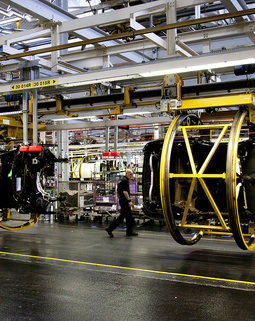Nigeria is Africa's most populous and economic country. Despite the economic challenges that the country faces today, Nigeria continues to record strong growth over the mid-term. In Nigeria, automobile production is low, and most vehicles are imported. In 2014, the top import category was passenger cars after crude oil and bituminous minerals. Motor vehicle imports accounted for over 6 billion dollars, i.e., 11.5% of Nigeria's imports.
The Nigerian market highly demands used cars. Many used cars are US imports, as vehicles' specifications attract Nigerian consumers. However, used car importers in Africa make significant profits by importing from around the world for resale. Before the increase in tariffs on used car imports, Nigeria imported over 100,000 vehicles annually from the United States. By 2015, imports number had dropped. The Cotonou port is an important transit point apart from direct deliveries. Almost 85% of imported used cars from Benin go to Nigeria.
Number of vehicles
Nigerians have a poor culture of car maintenance. They prefer using cars until it breaks down and can’t be fixed. According to resources, the vehicles range from 1.3-10 million. The Nigerian Auto Index accounts for about a third of the global index, with fewer than 60 vehicles for every 1,000 people.
Nigeria's auto index is about a third of the market in the world, with no more than 60 cars per thousand consumers. After the introduction of the New Automotive Industry Development Plan (NAIDP), the Nigerian fleet's growth slowed markedly in 2015. Though, fleet growth is expected to stabilize at 4.5% - 5.5% each year in the short term.
The market for new and used cars ranges from 500,000 to 1 million per year. However, smuggling and a lack of information make it difficult to determine the exact fleet size of the Nigerian auto market. Additional challenges include vehicle registration and identification.
Sale of vehicles
It is estimated that in the current economic situation, only 2% of ordinary people can afford a new car.
Moreover, while some commercial banks offer auto financing, these loans are becoming less attractive to private consumers because the annual interest rate on loans exceeds 20% and requires an upfront payment of at least 10%. Most Nigerians still do not have access to new vehicles due to limited availability and finance. Only 70% of new purchases go to organizations indicating moderate demand in the private sector.
Manufacturing and Assembling
In the 1970s, Nigeria started vehicle assembly, partnering with six international automotive and commercial manufacturers to produce vehicles from CKD kits. But the production and capacity utilization has fallen sharply due to inconsistent policy implementation and corruption in local and federal sectors.
In 2014, the launch of NAIDP and tariffs on imports gained international interest. Currently, vehicles are assembled from imported SKD kits with a limited local supply input because of the lack of a reliable and sufficient domestic supplier base.
Although the current assembly figures are low, the automakers are interested in increasing annual production for a long-term prospect.





